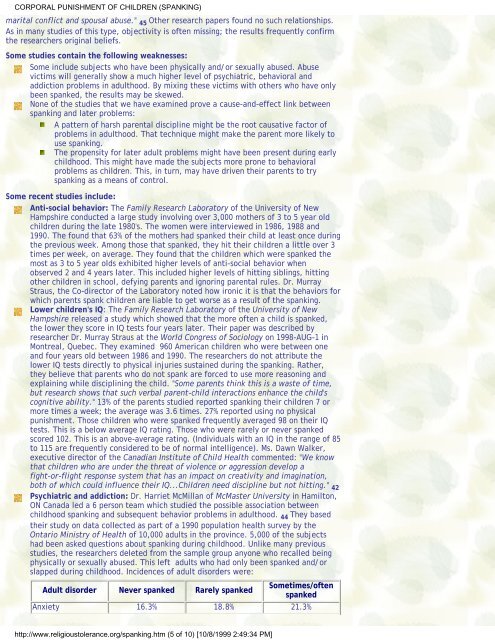spanking - Unauthorized web page
spanking - Unauthorized web page
spanking - Unauthorized web page
You also want an ePaper? Increase the reach of your titles
YUMPU automatically turns print PDFs into web optimized ePapers that Google loves.
CORPORAL PUNISHMENT OF CHILDREN (SPANKING)<br />
marital conflict and spousal abuse." 45 Other research papers found no such relationships.<br />
As in many studies of this type, objectivity is often missing; the results frequently confirm<br />
the researchers original beliefs.<br />
Some studies contain the following weaknesses:<br />
Some include subjects who have been physically and/or sexually abused. Abuse<br />
victims will generally show a much higher level of psychiatric, behavioral and<br />
addiction problems in adulthood. By mixing these victims with others who have only<br />
been spanked, the results may be skewed.<br />
None of the studies that we have examined prove a cause-and-effect link between<br />
<strong>spanking</strong> and later problems:<br />
A pattern of harsh parental discipline might be the root causative factor of<br />
problems in adulthood. That technique might make the parent more likely to<br />
use <strong>spanking</strong>.<br />
The propensity for later adult problems might have been present during early<br />
childhood. This might have made the subjects more prone to behavioral<br />
problems as children. This, in turn, may have driven their parents to try<br />
<strong>spanking</strong> as a means of control.<br />
Some recent studies include:<br />
Anti-social behavior: The Family Research Laboratory of the University of New<br />
Hampshire conducted a large study involving over 3,000 mothers of 3 to 5 year old<br />
children during the late 1980's. The women were interviewed in 1986, 1988 and<br />
1990. The found that 63% of the mothers had spanked their child at least once during<br />
the previous week. Among those that spanked, they hit their children a little over 3<br />
times per week, on average. They found that the children which were spanked the<br />
most as 3 to 5 year olds exhibited higher levels of anti-social behavior when<br />
observed 2 and 4 years later. This included higher levels of hitting siblings, hitting<br />
other children in school, defying parents and ignoring parental rules. Dr. Murray<br />
Straus, the Co-director of the Laboratory noted how ironic it is that the behaviors for<br />
which parents spank children are liable to get worse as a result of the <strong>spanking</strong>.<br />
Lower children's IQ: The Family Research Laboratory of the University of New<br />
Hampshire released a study which showed that the more often a child is spanked,<br />
the lower they score in IQ tests four years later. Their paper was described by<br />
researcher Dr. Murray Straus at the World Congress of Sociology on 1998-AUG-1 in<br />
Montreal, Quebec. They examined 960 American children who were between one<br />
and four years old between 1986 and 1990. The researchers do not attribute the<br />
lower IQ tests directly to physical injuries sustained during the <strong>spanking</strong>. Rather,<br />
they believe that parents who do not spank are forced to use more reasoning and<br />
explaining while disciplining the child. "Some parents think this is a waste of time,<br />
but research shows that such verbal parent-child interactions enhance the child's<br />
cognitive ability." 13% of the parents studied reported <strong>spanking</strong> their children 7 or<br />
more times a week; the average was 3.6 times. 27% reported using no physical<br />
punishment. Those children who were spanked frequently averaged 98 on their IQ<br />
tests. This is a below average IQ rating. Those who were rarely or never spanked<br />
scored 102. This is an above-average rating. (Individuals with an IQ in the range of 85<br />
to 115 are frequently considered to be of normal intelligence). Ms. Dawn Walker,<br />
executive director of the Canadian Institute of Child Health commented: "We know<br />
that children who are under the threat of violence or aggression develop a<br />
fight-or-flight response system that has an impact on creativity and imagination,<br />
both of which could influence their IQ...Children need discipline but not hitting." 42<br />
Psychiatric and addiction: Dr. Harriet McMillan of McMaster University in Hamilton,<br />
ON Canada led a 6 person team which studied the possible association between<br />
childhood <strong>spanking</strong> and subsequent behavior problems in adulthood. 44 They based<br />
their study on data collected as part of a 1990 population health survey by the<br />
Ontario Ministry of Health of 10,000 adults in the province. 5,000 of the subjects<br />
had been asked questions about <strong>spanking</strong> during childhood. Unlike many previous<br />
studies, the researchers deleted from the sample group anyone who recalled being<br />
physically or sexually abused. This left adults who had only been spanked and/or<br />
slapped during childhood. Incidences of adult disorders were:<br />
Adult disorder Never spanked Rarely spanked<br />
Sometimes/often<br />
spanked<br />
Anxiety 16.3% 18.8% 21.3%<br />
http://www.religioustolerance.org/<strong>spanking</strong>.htm (5 of 10) [10/8/1999 2:49:34 PM]






